Dental Implants — Brampton, ON
The Most Complete Tooth Replacement
For patients who are serious about addressing their tooth loss, they should really only consider one treatment: dental implants. In short, they are the most advanced replacement available today, able to deliver the strongest, best looking, and most durable results by far. With them, it won’t just feel like you’ve replaced your teeth, it will feel like you’ve gotten your real teeth back. To learn more about implants and how we can use them to rebuild your smile, contact Salvaggio Dentistry today.
Why Choose Salvaggio Dentistry For Dental Implants?
- Entire Procedure Performed Under One Roof
- FREE Dental Implant Consultation
- Seamlessly Replace Any Number of Missing Teeth
What Are Dental Implants?

Dental Implants are the only tooth replacement option that can replace the entire missing structure of a tooth, not just the visible portion above the gumline. A dental implant is comprised of three parts: an implant post, abutment, and final restoration. The dental implant post is surgically inserted into your jawbone to mimic the roots of your missing tooth. On top of the post is a small connector piece called an abutment, which fastens your final restoration in place. Your final restoration will be a custom-made crown, bridge, or denture depending on the extent of your tooth loss. Rebuilding your pearly whites from the roots up gives you a smile that looks, feels, and functions just like natural. That’s why they’re widely considered to be the gold standard of tooth replacement!
The 4-Step Dental Implant Process

Our team has received advanced training to perform the entire implant procedure right here at Salvaggio Dentistry. This saves our patients time, money, and stress because they can get everything they need in one place while working with the same team the entire time. If you’re interested in learning how dental implants work, allow us to provide greater detail below.
Initial Dental Implant Consultation

You will first schedule a consultation with your implant dentist to determine your candidacy for treatment. There will be a thorough evaluation of your oral and overall health as well as your jawbone density. If it is discovered that you require preliminary treatment before undergoing dental implant surgery, we will recommend periodontal therapy, bone grafting, or even tooth extraction depending on your needs.
Dental Implant Surgery
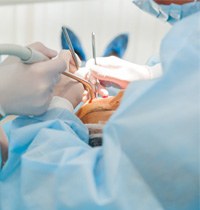
Since Salvaggio Dentistry can place dental implants in-house, you do not need to worry about seeking a referral. Instead, you will arrive on the day of your procedure to receive local anesthesia. This will help you become more comfortable and feel no pain. After making one or more small incisions in your gums, we will place each implant post, accordingly, ensuring they are properly in place. We’ll then close the tissues and send you home to begin the recovery process.
Dental Implant Osseointegration/Abutment
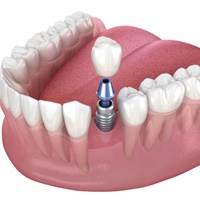
Over the next 3-6 months, you will follow detailed instructions from our team so that your implant posts and bone tissues can fuse. This is s a process known as osseointegration, which is necessary for the success of dental implant placement. After you’ve fully healed, you’ll return to our office to have your metal abutments put into place, as they will serve to connect the implant post with the customized restoration.
Delivery of Dental Implant Restorations

The last step in this series is to receive your finalized restoration. This might be a crown, bridge, or denture depending on how many teeth you need to have replaced. Once it is secured, you will be free to enjoy life with your new smile. Although it might take a bit of adjusting, you should face no real problems or issues once your restoration is in place.
Benefits of Dental Implants

Thanks to their unique placement, dental implants offer a wide range of important benefits you simply can’t get with other tooth replacement options. From your day-to-day life to your overall health, dental implants surpass dentures and dental bridges in every way.
Stay Looking Young

Because dental implants replace the roots of your teeth as well as the crown, your jawbone receives the stimulation it needs to remain strong and hold your facial muscles in place. When you’re missing teeth and don’t get them replaced with implants, your jawbone begins to deteriorate and the muscles of your face start to droop, making you age prematurely. With dental implants, you can stay looking your age or even younger!
Eat a Healthy, Well-Balanced Diet

People who are missing teeth or are stuck with an ill-fitting prosthetic often have to stick to soft foods, which aren’t usually the healthiest options. Since dental implants feel just like your natural teeth and provide ample support, you should be able to eat as many healthy, crunchy foods as you like, such as fresh fruits and vegetables. As a result, implants help improve not only your oral health, but your general health as well.
Preserve Your Remaining Teeth

In addition to keeping your face looking youthful, dental implants also keep your jawbone strong. A deteriorating jawbone puts you at risk for further tooth loss, so dental implants allow you to keep the teeth you have left for longer. They also prevent your remaining teeth from drifting out of place.
Practice Easy Maintenance

Believe it or not, you don’t have to take any special care of your implants beyond what you would give to your natural teeth. Simply brush and floss around your implant restoration every day just like you would if you still had all the teeth you were born with. Also, attend regular checkups and cleanings to make sure your implant is still in good condition.
Feel a Confidence Boost

It can be difficult to feel confident in your appearance when you have noticeable spaces in your smile. That’s where dental implants come in. They can give you back the smile you deserve, allowing you to grin proudly and live your life with confidence.
Smile for Years to Come

While dental implants may seem initially expensive, keep in mind that they are meant to last for several decades. In the long run, they’re cheaper than paying for a replacement bridge or denture every few years. If you take proper care of your implants, they should be able to last the rest of your life!
Who Dental Implants Can Help

In order to determine if you’re a good candidate for dental implants, we will need to conduct a thorough oral exam to see if your jawbone is strong enough, if your gums are healthy, etc. That said, no matter how many teeth you might be missing, dental implants very well may be the solution you’ve been looking for. If you are interested in finding out if this state-of-the-art tooth-replacement solution is right for you, give us a call or read on to learn more!
Who Is a Good Candidate for Dental Implants?

As we mentioned above, there are a few things we need to determine before we can move forward with dental implants. For example, is your jawbone strong enough to support them? If not, we will likely need to intervene with a bone graft first or explore your other treatment options, like traditional dentures. Similarly, if you have gum disease, then we will need to eliminate the infection first. Simply put, after giving you a quick exam, we can determine if dental implants are ideal for you or if any preliminary treatments are needed.
Missing One Tooth
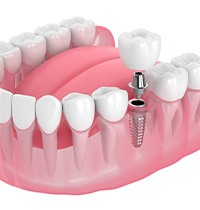
Traditionally, the gap left by a missing tooth was replaced with a dental bridge. Although this is still an option, there is one considerable drawback: healthy teeth would often need to be altered in the treatment process. Fortunately, that’s not the case with dental implants. Instead, the post is positioned between two healthy teeth without disturbing them. Once in place, we can attach a porcelain crown to seamlessly close the gap.
Missing Multiple Teeth
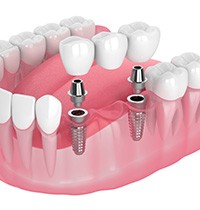
If you are missing several teeth throughout your mouth, we can replace each one with a single dental implant or anchor partial dentures in place with several dental implants. But what if you are missing several teeth consecutively? In that case, we can use just two implant roots to support the prosthetic teeth, bridging the gap in the process. This innovative tooth-replacement solution is not only more stable than regular ones, but it also doesn’t have that telltale black line near the gums, giving them a more natural appearance.
Missing All Teeth
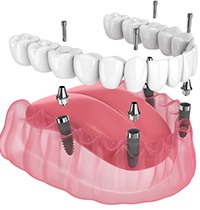
In short, even if you are missing an entire row of teeth, implants are still a viable option. In this case, four to six dental implants are strategically placed along the arch. Then, a custom-made denture is anchored in place, giving it the hold and security a traditional removable denture can never replicate. The final result is a strong, healthy, and beautiful smile. Plus, with proper care, you can enjoy the results for several decades!
Understanding the Cost of Dental Implants

Because dental implants are so versatile, there actually isn’t a set cost for the treatment. Every implant procedure is slightly different based on a patient’s particular needs and situation. The number of implants needed, the kind of restoration used, and any necessary preparatory procedures can all influence the amount you’ll spend on implants. Before beginning treatment, we’ll be sure to go over all relevant pricing information so you can know everything you need to decide whether or not to proceed.
While dental implants are more expensive upfront compared to traditional replacement options, they actually end up saving most patients money over time. Why? Largely because of their longevity. While a patient with a regular bridge or denture will need to replace it every 5-7 years, a person with implants can look forward to them lasting for multiple decades, perhaps for the rest of their life. Because of this low maintenance, implant patients typically save thousands by comparison.
Types of Dental Implants
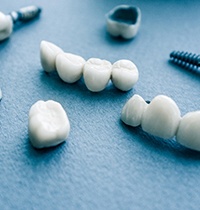
There are many factors that can influence the cost of dental implant placement, such as the number of implants you’re receiving. A single implant topped with a crown will cost significantly less than multiple implants supporting a dental bridge or denture, for example. There are also different types of dental implants from different manufacturers, which may come at different costs. During your initial consultation with your implant dentist in Brampton, we’ll discuss the details of the procedure with you as well as your options for the type and number of implants you should receive.
The Parts of Your Dental Implant

Every stage of the dental implant placement process incurs a unique cost. Don’t worry, however. You won’t have to pay for the entirety of your new grin at once. Because treatment takes place over the course of several months, you can pay for your treatment one procedure at a time. Some of what you can expect to pay for might include:
- Preliminary procedures like tooth extractions, bone grafts, or gum disease treatment
- The implant placement surgery itself
- Placement of the abutment, or the metal connector that attaches the implant to the restoration
- Placement of the final restoration (a crown, bridge, or denture)
Are Dental Implants Worth the Investment?
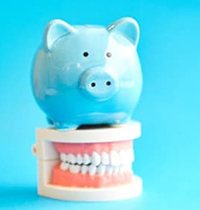
While dental implants typically cost more up front than other methods of tooth replacement, you will actually end up saving money in the long run. This is because implants have the potential to last for several decades, if not for the rest of your life, with minimal maintenance involved. They don’t need to be replaced every few years like bridgework or dentures. Moreover, they look and feel like a completely natural part of your smile, and it’s nearly impossible to put a price on that benefit. Implants also prevent bone loss in your jawbone, which keeps you looking young and vibrant. Most patients who have received dental implants have said that they were more than worth the investment.
Does My Dental Insurance Cover Dental Implants?

The good news is that more and more insurance companies are starting to offer coverage for dental implants. However, you’ll have to check your individual policy to find out just how much coverage you’re eligible to receive. If it does not cover the cost of the implant itself, it may help with preliminary procedures, like gum disease treatment, for example. We at Salvaggio Dentistry accept most major insurance policies, and we will work with you to help maximize your benefits and even file your claims for you so you can get those benefits as soon as possible.
Dental Implant Technology

Did you know dental implants tend to boast a success rate of 95% or more? While they represent the gold standard of tooth replacements and can last several decades to a lifetime with proper care, one of the major components that makes them effective is the procedure itself. That’s why, to guarantee an effective, precise, and smooth treatment for patients, our team only uses state-of-the-art dental implant technology for the most reliable results! Here are a couple of advanced devices we utilize to help create your brand-new teeth.
Guided Dental Implant Surgery
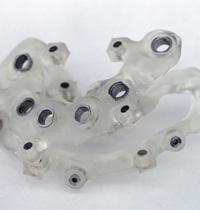
Our dental practice can perform the entire dental implant process in-office, so you won’t have to worry about driving across town to visit an outside specialist. One of the reasons we can reliably and accurately place titanium posts is our surgical dental implant guides. By using 3D imaging, we can create a virtual model of your smile, which will include where your metal posts will need to be inserted. Then, we’ll develop a completely customized guide that fits over the areas where we’ll place your implants, providing your surgeon with the exact location to embed the new tooth root. This allows our team to avoid complications like damaging nerves that we can’t visually see around the surgical site.
TRIOS Digital Impression System

Dental implants are best known for both their natural-looking appearance and their superior stability compared to other teeth replacements. This is due to them being personalized to match your specific smile and unique dental needs. In the past, dentists used to make impressions of patients’ smiles with putty, which typically made it difficult for patients to breathe comfortably. Instead, today our team can utilize the TRIOS digital impression system. This device involves taking a swift scan of your teeth and developing a precise image of your bite in real-time. With this rendering, our team can ensure your new restoration (crown, bridge, or denture) looks beautiful and fits naturally!
Dental Implants Post-Op Instructions

Once your dental implants are placed, you can rest knowing that the difficult part of your implant treatment is complete. What comes next is your aftercare, a crucial yet relatively straightforward process that is largely affected by your habits after surgery. By keeping the following tips in mind, you can ensure your recovery is smooth and free of any complications. If you do notice any side effects that appear abnormal, please give us a call and we’ll help however we can.
What to Do Directly After Dental Implant Surgery

Taking care of the newly formed blood clot over your treatment site should be a top priority immediately following your surgery. If the clot becomes loose and falls off, it can lead to dry socket, a very uncomfortable condition that’s easily preventable with the steps below:
- Do not use a straw or spit forcefully
- Avoid smoking or using tobacco for the next several days (especially the first day)
- Do not touch the treatment site with your tongue or fingers
- Do not try to remove any stitches placed by our office
Common Side Effects

Mild side effects are not only common, but expected following any oral surgery, not just dental implant placement. You can expect the following over the next few days:
- Intermittent bleeding – This can be managed with gauze and light pressure.
- Facial swelling – To bring down swelling and alleviate discomfort, apply a cold compress for 10 minutes. Remove for an additional 10 minutes and reapply for up to one hour.
- Discomfort – Painkillers, either over-the-counter or prescriptions, can be taken over the next few days.
Your symptoms should improve within a week. If they do not, call us for additional guidance.
Diet

You’ll need to stick to a liquid and soft diet over the next week after implant surgery to prevent undue stress on your treatment site. Consider this brief list of foods to have in your fridge or pantry ahead of your procedure:
- Applesauce
- Fruit smoothies
- Yogurt
- Eggs
- Pasta
- Soups and stews (consume at room temperature)
- Mashed potatoes
- Ice cream
- Pudding
Health & Oral Hygiene
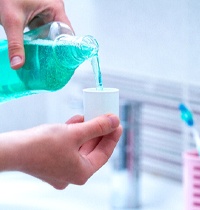
You should still brush and floss the day after your surgery, just make sure to use caution when cleaning around the treatment site. Be as gentle as possible and rinse your mouth out two to three times a day either with salt water or a prescribed mouthwash. We do not recommend using any mouthwashes that contain alcohol as this can easily cause dry mouth.
What to Do After Your New Teeth Are Attached

After about four to six months have passed and the implant has fully fused with your jawbone, you’ll come back to our office to receive your permanent restoration. This could be a crown, bridge, or denture depending on your treatment plan. Regardless of what you receive, you can expect it to be lifelike and feel natural. It’s normal to experience some sensitivity in your implant site after the restoration is placed, but not bleeding or swelling.
Dental Implant Failure & Salvage

Not only do we place dental implants, but we can also lend you a helping hand if they happen to fail. When you get to our office, we’ll ask about your symptoms, and we’ll take a close look at the implant posts and the area around them to figure out what went wrong. Afterward, we’ll create a treatment plan to help you protect the health of your smile. We’ll let you know whether you’ll be able to keep your current dental implants or if they’ll have to be removed and potentially replaced later.
Learn More About Dental Implant Failure & Salvage
Maintaining & Caring for Your Dental Implants

While dental implants can effectively rebuild your missing teeth and last decades to a lifetime, you’ll have to take proper measures to make the most of them. Without the right care and precautions, they could be vulnerable to complications, damage, and even infections, which could lead to their failure. Fortunately, our team can provide you with a simple list of ways to care for your dental implants so that you can enjoy your brand-new smile for many years to come!
Make Oral Hygiene a Priority

Although dental implants can’t get cavities, it doesn’t mean any remaining natural teeth and connective tissues won’t be susceptible to decay or infections. That’s why you’ll need to practice good oral hygiene every day, including brushing, flossing, and rinsing with mouthwash, especially after every meal. In this way, you can keep a fresh smile and protect your pearly whites from any complications that could put your implants at risk.
Eat a Healthy Diet

Once you’ve received your new pearly whites, you should be able to enjoy most of your favorite foods without having to worry about your restorations moving around. This also means you can expand your diet and include more vitamin-rich and nutritious meals, such as fruits, vegetables, dairy products, and lean meats. These foods can help promote healthier gums and stronger bone tissue, allowing your dental implants to have a higher chance of success.
Break Bad Habits

Certain oral habits can be detrimental to your smile, such as chewing on hard objects, using your teeth as tools, and using tobacco products. Even if your dental implants are constructed out of durable porcelain, they can still become damaged over time and/or fail. To avoid any potential complications and reduce your risk of implant failure, you’ll want to work on quitting habits that can harm your new teeth.
Protect Your Dental Implants

Dental implants can also become damaged by wear and tear over time or by sudden impacts due to physical activities, such as sports. If you tend to contact sports or have found that you grind/clench your teeth during sleep, you’ll want to consider getting custom-made mouthguards or nightguards for bruxism. These oral appliances will provide cushion and protection for your natural teeth and dental implants, ensuring that you can make the most of them for longer.
Schedule Regular Dental Checkups

Even though dental implants have a high success rate of 95% or more, it’s important to visit your dentist for checkups and cleanings. Not only can they help remove plaque and tartar from hard-to-reach places, but they can also address any developing issues that could pose a risk to your implants and oral health. The sooner they can treat an underlying problem, the higher the chance of maintaining a strong, healthy, and beautiful smile.
Dental Implants FAQs
Dental implants in Brampton are the most reliable method of tooth replacement, but they are a big investment. It’s normal to have some concerns about the treatment, but there’s no need to worry. Your dentist at Salvaggio Dentistry will explain everything during your initial consultation. You can also find the answers to the most frequently asked questions below. If you can’t find what you’re looking for, feel free to contact our office to speak with a member of our team.
Can I Take Dental Implants Out?
Dental implants are meant to provide a long-lasting solution for missing teeth. They are unique because implant posts are surgically placed into your jaw to serve as tooth roots. Your bone will fuse to them through a process called osseointegration. Therefore, only a trained dental professional can remove them. However, some implant dentures can be taken out for easy cleaning.
Does It Hurt to Get Dental Implants?
You don’t have to worry about a painful day in the dentist’s chair. Sedation or anesthesia will be used to keep you comfortable, so you won’t feel anything during your surgery. It’s normal for your mouth to be sore for a few days after the effects of any medications wear off. You can manage it with any prescribed or OTC pain medications recommended by your dentist. Apply cold compresses to reduce pain, swelling, and bruising. Your implant dentist in Brampton will review any additional aftercare instructions before you go home, like sticking to a liquid diet for a couple of weeks.
How Long Do Dental Implants Last?
Dental implants have over a 95% success rate and are proven to last for 30 years or longer with the right care. Many factors affect the duration of your results, like the materials used and the health of your jawbone. The location of the implant can also matter. Back teeth undergo more wear and tear, so they can have a slightly shorter life expectancy than those in the front of the mouth. You can get the most from your investment with good oral hygiene and regular dental care.
What Are the Signs of Dental Implant Failure?
Dental implant failure occurs in less than 5% of cases, but it’s best to monitor for any signs of a problem, like redness or swelling near the implant. Pain when placing pressure on it can also indicate there’s an issue. Your dental implant should never feel loose. If you develop any concerning symptoms, don't wait to contact our office. Quick treatment is necessary to prevent dental implant failure.
Am I Too Young to Get Dental Implants?
It goes without saying that children – from toddlers to middle-school students – are not candidates for dental implants. In fact, it’s possible for college-age students to be too young as well! Whether or not you’re a candidate ultimately depends on if your jaw is fully developed, if you take good care of your smile, and if your jawbone is strong enough to support the implant. In other words, the only way to know for certain if you’re a candidate is by coming in for a consultation with our Brampton dental team.
What Can Cause Dental Implants to Fail?
Dental implants have more than a 95% success rate, which means there is a small chance that they will fail. The two most common reasons this happens are peri-implantitis (a form of gum disease) and failed osseointegration (when the implant and jawbone don’t fuse properly). However, it’s possible for chronic teeth grinding, tobacco use, and certain health conditions, like diabetes, to be the cause as well.
Note: At your consultation, we will learn all about your medical and dental history with the goal of determining if you’re a good candidate and reducing your chances of experiencing dental implant failure.
Will I Have to Take Off Work for Dental Implant Surgery?
We encourage our patients to take a day or two off following the procedure so they have plenty of time to heal. If you have a physically demanding job, then we may recommend taking even more time off to prevent complications from arising. Ultimately, the length of time we recommend dedicating to resting depends on your unique situation.
Will People Be Able to Tell That I Have Dental Implants?
People will certainly be able to notice if you go from no teeth to a complete smile. However, dental implants themselves look incredibly natural because the size, shape, and shade of each one are customized to your specific dental needs and smile goals. Furthermore, dental implants are the only tooth-replacement solution that is inserted directly into the jawbone, which makes it function just like your natural teeth.
Is There Anything I Shouldn’t Eat with Dental Implants?
There are some foods that we recommend avoiding. Gummy candies are a great example because they are packed with sugar and their sticky consistency can tug on your restoration. Tortilla chips are another example because they are starchy and crunchy enough that they can result in a noticeable chip. Simply put, it’s best to stick to nutrient-dense, smile-friendly foods as often as you can, like oatmeal, plain yogurt, and fresh fruits and vegetables.
Can I Get Dental Implants If I Smoke?
Smoking doesn’t automatically disqualify you. It is, however, something we need to seriously consider when determining if dental implants are the best tooth-replacement solution for you. At the very least, you will need to refrain from using all tobacco products two weeks prior to your procedure and for three months afterward.
